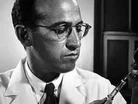Jonas Salk: Google Reminds the World that a Cure for Ebola is Near

Today, Google is celebrating what would have been the 100th birthday of Dr. Jonas Salk, the American physician and medical researcher who developed the first safe and effective vaccine for polio.
The celebration comes at just the right time, as Americans are hanging on to hope that the end of the spread of the deadly Ebola virus disease is coming soon.
Back in 1954, over 300,000 doctors, nurses and other volunteers across the U.S., Canada and Finland participated in one of the most monumental medical trials of all time. Polio was a medical oddity that was increasingly growing prevalent – much like Ebola in today’s world.

How Dr. Jonas Salk Cured Polio
In 1947, Salk took a position at the University of Pittsburgh, where he began conducting research on polio, also known as infantile paralysis. Four years later, Salk had determined that there were three distinct types of polio viruses and was able to develop a “killed virus” vaccine for the disease.
In the aforementioned medical trial, 650,000 schoolchildren were given the newly-developed vaccine, 750,000 were given a placebo and over 400,000 children acted as a control group. The vaccine was found safe and effective and polio was completely eradicated in the U.S. by 1979.
When the vaccine was approved for general use in 1955, Salk became a national hero. President D. Eisenhower gave Salk a special citation at a ceremony held in the Rose Garden at the White House.
Salk made the decision not to patent the vaccine in order to see it as widely distributed as possible.
What We Can Learn From His Successes
As the world faces another virus that has already taken the lives of 4,922 individuals, the life and legacy of Dr. Jonas Salk serves as an inspiration to health care professionals worldwide to continue making the efforts to put an end to Ebola.
As nurses are on the front line, caring for patients and working around the clock to ensure proper quarantine procedures are taken when needed, and researchers and scientists continue studying the disease, the hope that a cure for Ebola will come soon remains alive.
- Healthcare providers: The route to digital transformation successTechnology & AI
- Stryker appoints a new head for its India operationsTechnology & AI
- Baylor Scott & White Health and Memorial Hermann Health System are set to mergeDigital Healthcare
- Pfizer’s announces new CEOTeleHealth & COVID-19



